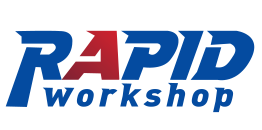What Can Rapid Workshop’s Finishing Services Do For You?
Your parts aren’t really complete until they’ve gone through our professional finishing department. Whether in metal or plastic, from a one-off prototype to full mass production, we have everything you need to take your project that final step to perfection.
A Full Suite of Professional Finishing Services
We don’t just make parts. We make them better by applying a variety of treatments to improve their appearance, performance and durability. Learn more about our major finishing services.
* Anodizing
* Painting
* Color Matching
* Pad and Silk Screen Printing
* Sanding and Polishing
* Vapor Polishing
* Blasting
AnodizingRapid Workshop is an expert on anodizing aluminum, magnesium or titanium. Anodizing helps to resist corrosion, increase surface hardness, improve resistance to wear and dissipate heat. It’s also an ideal surface treatment for painting and priming, and it looks great too. |
PaintingA great paint job is one of the best ways to make your product stand out from the crowd. Using only the finest PPG automotive polyurethanes, we can replicate virtually any color, tint or hue in our climate-controlled, automated spray room. Our master painters can supply millions of colors, in matte, flat, semi-gloss or glossy finishes. Soft-Touch Painting You can also have a soft-touch paint coating on almost any surface, either plastic or metal. This type of paint gives a matte-finished, non-slip texture that also blocks glare and hides fingerprints. It’s common on hand-held controllers and front panels on consumer goods that get touched a lot. The coating is clear and so it won’t change the color of the base material. Product developers should note that soft coatings are not a substitute for actual rubber or elastomer overmoldings, which are much more durable. |
Color MatchingGetting a perfect color match can be tricky. That’s why we use advanced color spectrophotometers to make precise measurements of surface color, tint and reflectance. This helps us to match your color samples, and to ensure that we apply Pantone or other RGB colors exactly to your specifications. |
Pad PrintingMany products require a company’s brand name or logo printed on the surface. How is this done? One way is to use pad printing. Your desired image is embossed onto a hard rubber block.This becomes a stamp that we use to imprint simple words and graphics on flat or slightly curved surfaces. Pad printing is very inexpensive and fast. Pad printing is limited, however, to a single color at a time. Silk Screen PrintingWhat if you need more color options, or you have a complex graphic you want to apply? Silk screen printing may be the answer. It involves using a fine mesh screen that’s partially covered by a stencil of the desired pattern. For more complicated images or multiple colors, several different screens and stencils are used in series. Paint is then squeezed through the mesh and onto the surface of the substrate in every location that’s not blocked by the stencil. With careful choreography it’s possible to make sophisticated multi-colored images, text and colored patterns on almost any hard flat surface. Silk screen printing is inexpensive, versatile, and stencils can be made quickly. Is it right for your project? Contact us to learn more. |
Sanding And Polishing
Sanding is not just used for painting preparation but also to create the final surface effect. We can provide brushed and satin surfaces on metal, and we make optically clear polishes on transparent plastic. Hand sanding is also a very important part of the vacuum casting process, because master patterns must be carefully prepared before copies can be made.
Vapor PolishingVapor polishing is a specialized treatment to create optically-clear polycarbonate (PC) plastic. This method can also be used to repair minor surface defects, and is ideal for achieving an extremely clear surface on areas that can’t be reached by hand. It involves using Weldon 4 gas to melt the surface of the plastic at the molecular level, which flows out tiny scratches. |
BlastingBlasting means to spray some type of abrasive media onto the workpiece. Examples of abrasives include sand, garnet, walnut shells, or high-pressure water. It’s used to clean and de-burr parts, while preparing them both mechanically and chemically for later surface finishes. Blasting also imparts unique textures, frosting, pebbling, etc. |














